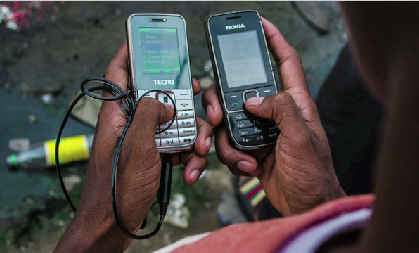Algorithms are becoming an increasingly pervasive aspect of everyday life – so much so that a recent UK Council for Science and Technology report described our epoch as the ‘age of algorithms’. Yet despite their prevalence, often providing the driving force behind our usage of a range of products and services from mobile phones to insurance policies, they remain relatively obscure to the general […]
Author: Annika Burgess
ICT empowers communities in fight against Ebola
The current outbreak of Ebola in West Africa is the worst on record, with the World Health Organization reporting 5,420 deaths – Sierra Leone, Guinea and Liberia have been the hardest hit nations. As international efforts are stepped up to combat the disease, attention has turned to the ways in which mobile technology can assist in Ebola awareness, diagnosis and prevention.
Bringing innovation to the development agenda
The Secretariat of the African, Caribbean and Pacific (ACP) Group of States are pleased to announce that a two-day High-Level Symposium on Private Sector Development in ACP countries will take place at the ACP House in Brussels on the 10th and 11th of November, 2014, bringing together various stakeholders including ACP Missions, Embassies and regional economic communities, private sector actors, international organisations and other […]
eLearning Africa 2015 Call for Proposals now open!
The tenth edition of eLearning Africa will take place on May 20 – 22, 2015, at the African Union Headquarters, Addis Ababa, Ethiopia. In 2006, the inaugural event also took place in Ethiopia, and Rebecca Stromeyer, founder of the event, recently reflected on the impact that ten years of eLearning Africa has had on the ICT-enhanced learning sector in Africa: “During its ten-year history, […]
Open source, global impact: the rise of humanitarian mapping
The potential benefits of open source software – affordability, accessibility, transparency and adaptability to local needs and languages – are particularly relevant in the global South and in advancing development goals. Humanitarian mapping projects in Africa using OpenStreetMap are one example of how open source technology allows for greater collaboration and shared benefits.
Arms race to liberate Africa’s data
Open data could add up to $3 trillion worth of economic activity per year worldwide, according to a study by McKinsey Consultants. But in the race to liberate thousands of data-sets from the government and business sectors, the African continent is seen as lagging behind. “Nowhere is the need for better data more urgent than in most African countries,” says the Data for African […]
3D printing drives innovation in Africa
Aortic valves, fighter jets, coral reefs… pizza? Just four of the headline-grabbing products dished out by 3D printers over the last two years. Alongside this dramatic experimentation with a not-so-very-new technology comes the usual round of wild speculation: a 3D printer for every home, the end of manufacturing as we know it; 3D-printed firearms, the end of civilisation as we know it. 3D printers […]
New learning opportunities for marginalised girls in Kenya
Although gaps in education affect both boys and girls in Kenya, a recent UNESCO report reveals that girls are the most affected. By the end of the decade only 23% of girls from poor households in rural areas of Sub-Saharan Africa completed primary education and, if these trends continue, boys from wealthy families will achieve universal primary completion in 2021, while disadvantaged girls will […]
How the revolution failed Egypt’s students
In his opinion piece, originally published in the eLearning Africa Report 2014, Dr Leslie Croxford, Senior Vice-President for teaching and learning at the British University in Cairo, examines how historic events have shaped Egypt’s higher education system. He reflects on how opportunities for reform arose from the 1952 Egyptian Revolution but, despite student uprising, the Revolution of 2011 failed to meet calls for change. Find the reply […]
ICT enters Egypt higher education debate
A recent opinion piece in the eLearning Africa Report 2014 took aim at Egyptian higher education, claiming that the system has been ‘unable to reform itself’ to meet certain student expectations. However, this article painted just one picture; another, one which shows attempts to create a solid higher education structure, together with effective policies and programmes – especially in regard to ICT – is […]








